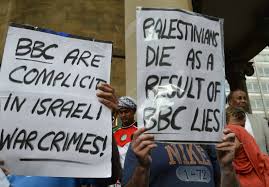Learn about the history of the Palestinian struggle for freedom, equality and justice by exploring major events in the history of their oppression on this day of the year.
26 January
 THE BBC's PHONEY IMPARTIALITY EXPOSED
THE BBC's PHONEY IMPARTIALITY EXPOSED
On this day in 2009, the BBC refused to broadcast the humanitarian appeal for Gaza by the Disasters Emergency Committee, which followed Israel’s massacre of over 1,400 Palestinians in the enclave. The BBC claimed it was “to avoid any risk of compromising public confidence in the BBC’s impartiality”. The state broadcaster had allowed many similar DEC appeals. Disturbing images of Israel’s devastation of Gaza transmitted into every UK home would have raised difficult questions for a UK ally and UK arms companies.
فضح الحيادية المزيفة لهيئة الإذاعة البريطانية
26 يناير
في هذا اليوم من العام 2009م، رفضت هيئة الإذاعة البريطانية بث المناشدة الإنسانية من أجل غزة من قبل لجنة طوارئ الكوارث، عقب المذبحة التي نفذتها إسرائيل وراح ضحيتها أكثر من 1400 فلسطينيا في القطاع المحاصر. وزعمت هيئة الإذاعة البريطانية أن ذلك الموقف كان "لتجنب أي مخاطرة بالمساومة بثقة الجمهور في حيادية الهيئة". علما بأن هيئة الإذاعة الحكومية قد سمحت بالعديد من مثل هذه المناشدات. ان بث الصور المقلقة ،للدمار الإسرائيلي لغزة، إلى كل منزل في المملكة المتحدة كان سيثير أسئلة صعبة لحليف المملكة المتحدة وشركات الأسلحة البريطانية.
BBC Director General Mark Thompson claimed that broadcasting the DEC appeal would breach impartiality guidelines, while funds were being raised for devastated Gaza (while it was being bombed and shelled). Fundraising for Israel, one of the world's richest countires that was doing the bombing, would not pose any such risk.
Thompson claimed that broadcasting the humanitarian appeal would run
"the risk of reducing public confidence in the BBC's impartiality in its wider coverage of the story. Inevitably an appeal would use pictures which are the same or similar to those we would be using in our news programmes but would do so with the objective of encouraging public donations. The danger for the BBC is that this could be interpreted as taking a political stance on an ongoing story."
The state broadcaster's long term systematically skewed reporting on Israel/Palestine.
BBC = Bin & Bypass Complaints Robert Fisk wrote...of how an unnamed friend of his, “a Very Senior Correspondent of the BBC”, responded to a recent challenge. Fisk could no longer recall whether it “was about the BBC’s grovelling coverage of Israel or its refusal to show a film seeking help for wounded Palestinian children after the 2008-09 Gaza slaughter (on the grounds that this would damage the BBC’s ‘neutrality’)”. But the BBC correspondent was blandly dismissive: “I recognise this is an issue.”
Fisk skilfully unpacked the meaning of this “very revealing” BBC reply:
“Of course, what he should have said was: I know this is a problem. But he couldn’t. Because BBC-speak doesn’t allow words like problems – because problems have to be solved. And the BBC doesn’t solve problems. Because they do not exist. There are only ‘issues’. And issues only have to be ‘recognised’. Thus what my friend really meant was: ‘I know exactly what you’re talking about but I haven’t the slightest intention of admitting it, so piss off.'”
16-minute video: John Pilger on the false presentation of Palestine in Western media, UK complicity and duplicity. The BBC vocabulary of imperial propaganda - 'conflict', 'respond', etc.
